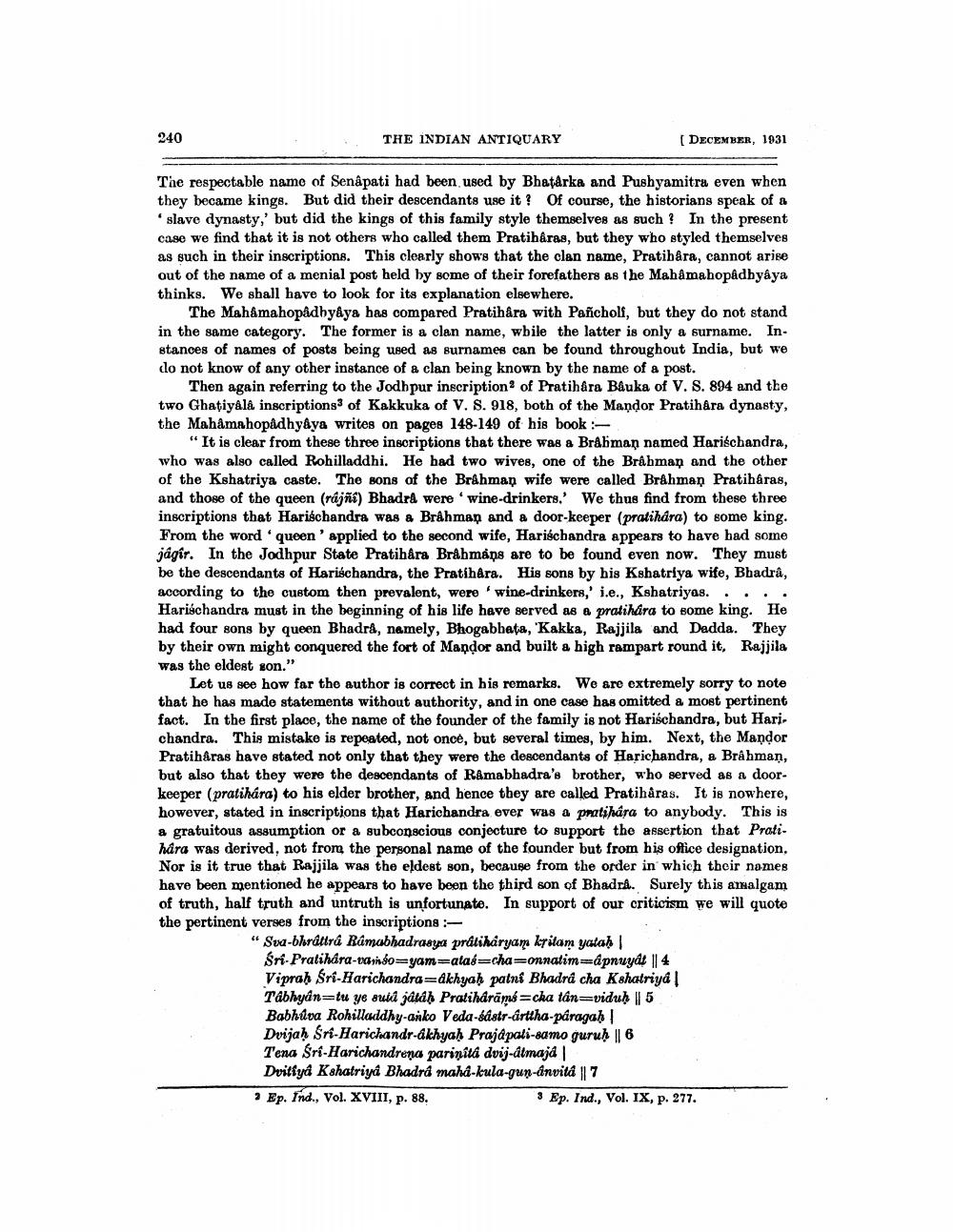________________
240
THE INDIAN ANTIQUARY
[ DECEMBER, 1931
The respectable name of Senapati had been used by Bhatarka and Pushyamitra even when they became kings. But did their descendants use it? Of course, the historians speak of a
slave dynasty,' but did the kings of this family style themselves as such ? In the present case we find that it is not others who called them Pratibâras, but they who styled themselves as such in their inscriptions. This clearly shows that the clan name, Pratibåra, cannot arise out of the name of a menial post held by some of their forefathers as the Mahamahopadhyaya thinks. We shall have to look for its explanation elsewhere.
The Mahamahopadhyâya has compared Pratihåra with Pancholi, but they do not stand in the same category. The former is a clan name, wbile the latter is only a surname. In. stanoes of names of posts being used as surnames can be found throughout India, but we do not know of any other instance of a clan being known by the name of a post.
Then again referring to the Jodhpur inscription of Pratihara Bauka of V. S. 894 and the two Ghatiyala inscriptions of Kakkuka of V. S. 918, both of the Mandor Pratihara dynasty, the Mahamahopadhyâya writes on pages 148-149 of his book
"It is clear from these three inscriptions that there was a Brahman named Harischandra, who was also called Rohilladdhi. He had two wives, one of the Brahman and the other of the Kshatriya caste. The sons of the Brahman wife were called Bråhman Pratihêras, and those of the queen (rajña) Bhadra were 'wine-drinkers.' We thus find from these three inscriptions that Harischandra was a Brâhman and a door-keeper (pratihára) to some king. From the word 'queen' applied to the second wife, Harischandra appears to have had some jágír. In the Jodhpur State Pratihåra Brahmaņs are to be found even now. They must be the descendants of Harischandra, the Pratihåra. His sons by his Kshatriya wife, Bhadra, according to the custom then prevalent, were wine-drinkers,' i.e., Kshatriyas..... Harischandra must in the beginning of his life have served as a pratihára to some king. He had four sons by queen Bhadra, namely, Bhogabbata, 'Kakka, Rajjila and Dadda. They by their own might conquered the fort of Mandor and built a high rampart round it, Rajjila was the eldest son."
Let us see how far the author is correct in his remarks. We are extremely sorry to note that he has made statements without authority, and in one case has omitted a most pertinent fact. In the first place, the name of the founder of the family is not Harischandra, but Hari. chandra. This mistake is repeated, not once, but several times, by him. Next, the Mandor Pratihåras have stated not only that they were the descendants of Harichandra, a Brahman, but also that they were the descendants of Råmabhadra's brother, who served as a doorkeeper (pratihára) to his elder brother, and hence they are called Pratiharas. It is nowhere, however, stated in inscriptions that Harichandra ever was a protihara to anybody. This is a gratuitous assumption or a subconscious conjecture to support the assertion that Pratihara was derived, not from the personal name of the founder but from his office designation. Nor is it true that Rajjila was the eldest son, because from the order in which their names have been mentioned he appears to have been the third son of Bhadra. Surely this amalgam of truth, half truth and untruth is unfortunate. In support of our criticism we will quote the pertinent verses from the inscriptions -
"Sva-bhráttrå Råmabhadrasya prátiharyam kritam yalah
Śri-Pratihdra-nando=yam=alas=cha=onnatim-rápnuydt || 4 Viprah Sri-Harichandraråkhyah patni Bhadra cha Kshatriya | Tabhyán=tu ye suul jardh Pratiharams=cha tân=viduh || 5 Babhiva Rohillaldhy-anko Veda-sdstr-arttha-páragah Dvijah Sri-Harichandr-akhyah Prajapali-samo guruh | 6 Tena Sri-Harichandrena parinitá dvij-dtmajd
Dvitiya Kshatriya Bhadrá mahd-kula-gun-invita || 7 ? Ep. Ind., Vol. XVIII, p. 88.
3 Ep. Ind., Vol. IX, p. 277.




